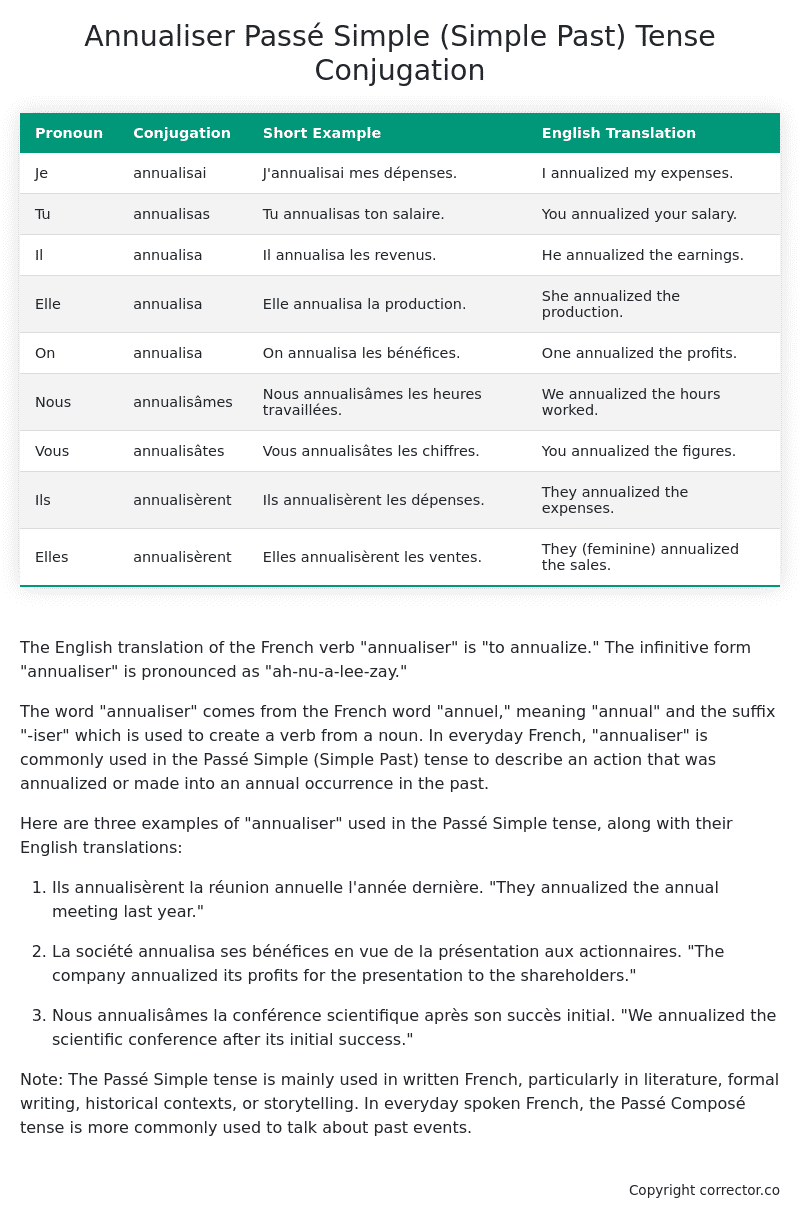Passé Simple (Simple Past) Tense Conjugation of the French Verb annualiser
Introduction to the verb annualiser
The English translation of the French verb “annualiser” is “to annualize.” The infinitive form “annualiser” is pronounced as “ah-nu-a-lee-zay.”
The word “annualiser” comes from the French word “annuel,” meaning “annual” and the suffix “-iser” which is used to create a verb from a noun. In everyday French, “annualiser” is commonly used in the Passé Simple (Simple Past) tense to describe an action that was annualized or made into an annual occurrence in the past.
Here are three examples of “annualiser” used in the Passé Simple tense, along with their English translations:
-
Ils annualisèrent la réunion annuelle l’année dernière.
“They annualized the annual meeting last year.” -
La société annualisa ses bénéfices en vue de la présentation aux actionnaires.
“The company annualized its profits for the presentation to the shareholders.” -
Nous annualisâmes la conférence scientifique après son succès initial.
“We annualized the scientific conference after its initial success.”
Note: The Passé Simple tense is mainly used in written French, particularly in literature, formal writing, historical contexts, or storytelling. In everyday spoken French, the Passé Composé tense is more commonly used to talk about past events.
Table of the Passé Simple (Simple Past) Tense Conjugation of annualiser
| Pronoun | Conjugation | Short Example | English Translation |
|---|---|---|---|
| Je | annualisai | J’annualisai mes dépenses. | I annualized my expenses. |
| Tu | annualisas | Tu annualisas ton salaire. | You annualized your salary. |
| Il | annualisa | Il annualisa les revenus. | He annualized the earnings. |
| Elle | annualisa | Elle annualisa la production. | She annualized the production. |
| On | annualisa | On annualisa les bénéfices. | One annualized the profits. |
| Nous | annualisâmes | Nous annualisâmes les heures travaillées. | We annualized the hours worked. |
| Vous | annualisâtes | Vous annualisâtes les chiffres. | You annualized the figures. |
| Ils | annualisèrent | Ils annualisèrent les dépenses. | They annualized the expenses. |
| Elles | annualisèrent | Elles annualisèrent les ventes. | They (feminine) annualized the sales. |
Other Conjugations for Annualiser.
Le Present (Present Tense) Conjugation of the French Verb annualiser
Imparfait (Imperfect) Tense Conjugation of the French Verb annualiser
Passé Simple (Simple Past) Tense Conjugation of the French Verb annualiser (You’re reading it right now!)
Passé Composé (Present Perfect) Tense Conjugation of the French Verb annualiser
Futur Simple (Simple Future) Tense Conjugation of the French Verb annualiser
Futur Proche (Near Future) Tense Conjugation of the French Verb annualiser
Plus-que-parfait (Pluperfect) Tense Conjugation of the French Verb annualiser
Passé Antérieur (Past Anterior) Tense Conjugation of the French Verb annualiser
Futur Antérieur (Future Anterior) Tense Conjugation of the French Verb annualiser
Subjonctif Présent (Subjunctive Present) Tense Conjugation of the French Verb annualiser
Subjonctif Passé (Subjunctive Past) Tense Conjugation of the French Verb annualiser
Subjonctif Imparfait (Subjunctive Imperfect) Tense Conjugation of the French Verb annualiser
Subjonctif Plus-que-parfait (Subjunctive Pluperfect) Tense Conjugation of the French Verb annualiser
Conditionnel Présent (Conditional Present) Tense Conjugation of the French Verb annualiser
Conditionnel Passé (Conditional Past) Tense Conjugation of the French Verb annualiser
Conditionnel Passé II (Conditional Past II) Tense Conjugation of the French Verb annualiser
L’impératif Présent (Imperative Present) Tense Conjugation of the French Verb annualiser
L’impératif Passé (Imperative Past) Tense Conjugation of the French Verb annualiser
L’infinitif Présent (Infinitive Present) Tense Conjugation of the French Verb annualiser
L’infinitif Passé (Infinitive Past) Tense Conjugation of the French Verb annualiser
Le Participe Présent (Present Participle) Tense Conjugation of the French Verb annualiser
Le Participe Passé (Past Participle) Tense Conjugation of the French Verb annualiser
Struggling with French verbs or the language in general? Why not use our free French Grammar Checker – no registration required!
Get a FREE Download Study Sheet of this Conjugation 🔥
Simply right click the image below, click “save image” and get your free reference for the annualiser Passé Simple tense conjugation!

Annualiser – About the French Passé Simple (Simple Past) Tense
Formation
Usage
Narration
Historical Context
Interactions with other tenses
Passé Composé
Imparfait
Conditional and Subjunctive
Summary
I hope you enjoyed this article on the verb annualiser. Still in a learning mood? Check out another TOTALLY random French verb conjugation!


